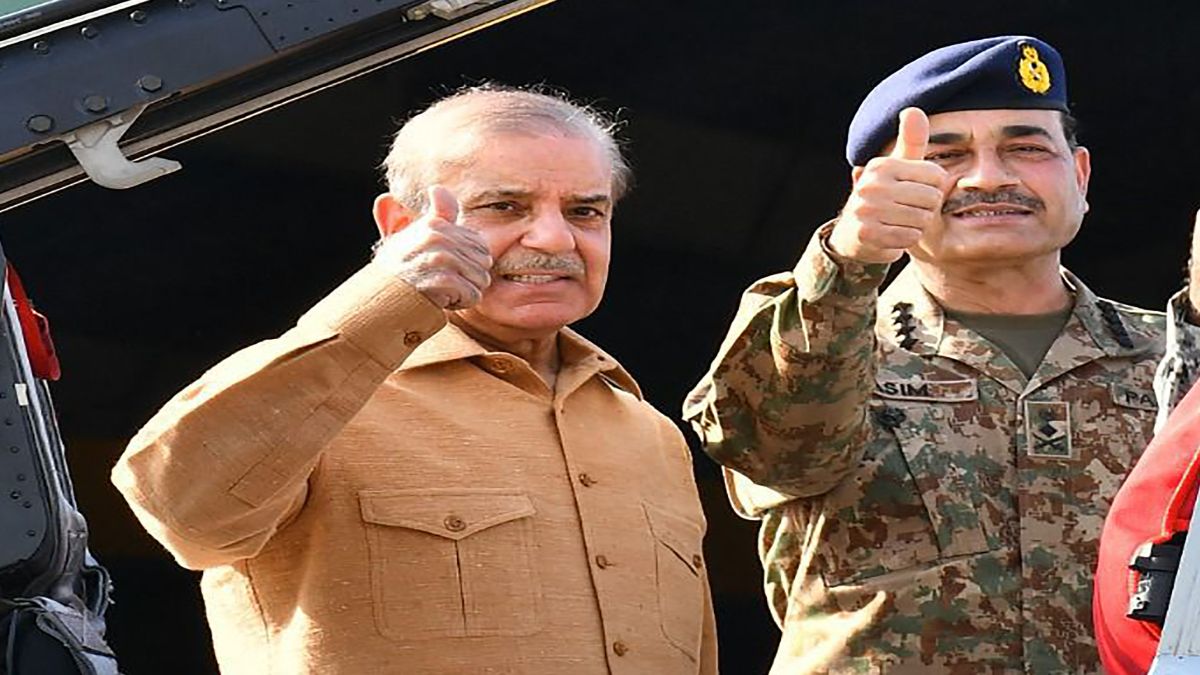Pakistan Army chief Asim Munir is becoming a regular feature in the country’s foreign policy, which is otherwise a domain of the Shehbaz Sharif government. Ironically, it is Sharif who is ceding diplomatic turf to Munir, but why?
Who is governing Pakistan — its elected government or its politicians in uniform? The recent engagements of Pakistan Army chief Asim Munir in the country’s diplomacy are not lost on Pakistan observers, who see these events as a carefully orchestrated display, stamping the authority of its military on the civilian government.
Prime Minister Shehbaz Sharif, who heads the elected government, has been seen positioning Pakistan’s military leadership at the forefront of global engagements. Munir accompanying Sharif at recent — and likely to follow the new routine in the upcoming foreign visits — indicates a deliberate effort to elevate the military boss’s political stature on the international stage.
Observers suggest these appearances are far from mere ceremonial gestures. Rather, they signal a deeper recalibration of Pakistan’s internal governance, highlighting the increasing dominance of the military over civilian authority.
This trend reflects Sharif’s apparent inability to withstand mounting pressure from Pakistan’s politically ambitious military leadership, effectively limiting the influence of the civilian government while legitimising the military’s active role in shaping both national and foreign policy.
Who represents Pakistan — Sharif or Munir?
Sharif’s diplomatic tour, which began on September 17, covered Saudi Arabia, the United Kingdom and the United States. According to senior government sources cited by News18, the trip aimed to strengthen bilateral relations, attract investment and engage in high-level security consultations.
Munir accompanied the prime minister throughout this tour, attending parallel meetings that focussed on defence cooperation, counterterrorism and regional security. Munir’s presence in these engagements was unprecedented in recent Pakistani political history, as military leaders rarely accompany civilian officials on such extensive international tours.
In Riyadh, Sharif and Munir were reported to have met Crown Prince Mohammed bin Salman, finalising a defence cooperation framework that reportedly treats an attack on either nation as an attack on both. This agreement also highlighted Munir’s role in international security dialogues Pakistan is engaging in. It is a domain traditionally dominated by civilian policymakers, except when Pakistan military directly took over the government.
Why is Munir going to the UNGA with Sharif?
Sharif’s schedule in the United States from September 22 to 26 included participation in the 80th United Nations General Assembly (UNGA) in New York. According to reports, the Foreign Office confirmed that Sharif would attend a meeting of select Muslim leaders with US President Donald Trump, aimed at exchanging views on regional and international peace and security.
Munir’s inclusion in this delegation was particularly notable, as it highlighted his integration into discussions of global strategic importance, a role rarely accorded to military leaders outside Pakistan.
Is Munir sourcing validation from Trump ties?
The upcoming meetings in New York come months after Trump hosted Munir at the White House in June this year, marking the first time a US president engaged directly with the head of Pakistan’s army. This private luncheon reportedly focussed on regional security issues, including the India-Pakistan conflict. Pakistan used the meeting to claim that there is an unusual level of trust and access granted to Pakistan’s military leadership.
Analysts have interpreted this engagement as a signal that Munir’s influence extends beyond military strategy into shaping Pakistan’s political narrative on the global stage. The fact that Munir was later seen attending high-profile summits and bilateral discussions alongside Sharif reinforces the perception that his role is increasingly political.
What Munir’s China visit showed?
Munir’s international exposure has also extended to China, where he accompanied Sharif during the Shanghai Cooperation Organisation (SCO) summit in Tianjin in early September. Reports indicate that Munir met Chinese President Xi Jinping alongside Sharif, in discussions that focussed on bilateral cooperation, defence moderniaation and regional stability.
While previous army chiefs had visited China primarily for defence-related matters, Munir’s participation in diplomatic discussions alongside the prime minister suggested a blending of military and political authority. This pattern positions Munir as a bridge between Pakistan’s strategic and political spheres, giving him greater control over Pakistan government domestically, and also in diplomacy.
Why is Army chief Munir getting so involved in Pakistan’s diplomacy?
By accompanying Sharif to high-profile summits and bilateral meetings, Munir’s visibility in international forums is reshaping perceptions of Pakistan’s governance — as a country that lets its military dictate the elected government. The regular appearance of Munir alongside Sharif in diplomatic settings conveys a message that Pakistan’s foreign policy is decided and dominated by the military, not the civilian government.
Sharif’s inclusion of Munir in these foreign visits also carries domestic political implications. In speeches addressing overseas Pakistanis and international audiences, Sharif has repeatedly emphasised the role of military leadership in government’s functioning — something other elected governments across the world do not favour or encourage.
End of Article

)

